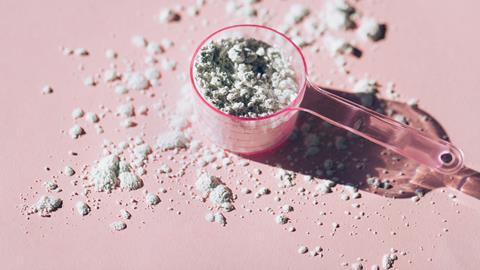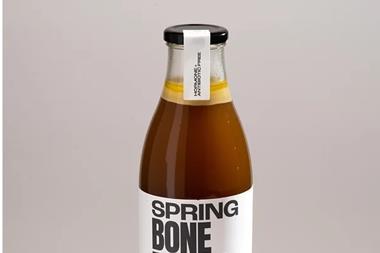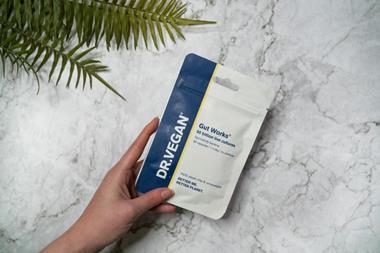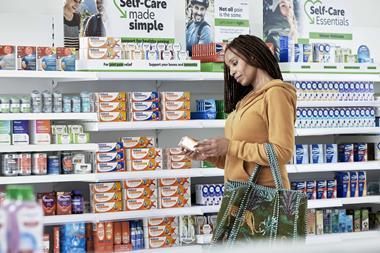Collagen is the anti-ageing ingredient taking the health and beauty world by storm. Now a host of food and drink brands are looking to make their move
When a Kardashian puts their name to a trend, it’s guaranteed to grab headlines. So when Kourtney told the world about her daily collagen habit in 2019 – one that comes in the form of a Pink Moon Milk Collagen Latte each morning – the health and beauty world paid close attention.
“Making my morning collagen,” Kardashian told her Instagram followers one day in November. “Great for skin, hair, nails, so many benefits. It also has protein, so it keeps me full until after my workout,” she added, pouring hot water on to the powdered breakfast.
It was a post that triggered a craze. While collagen has long been an ingredient of supplement pills and certain cosmetics, the past three years has seen a raft of collagen-containing food and drink products join the market, all promising anti-ageing benefits and great taste credentials to boot.
The past year has seen launches from Jenki Matcha, Australian company Krumbled Foods, New Nordic, Fyx and Your Good Health Co, to name just a few.
The latter has already secured a listing in Superdrug for its Your Beauty Collagen drinks, which contain bovine collagen, while Fyx rolled out its marine collagen waters into Holland & Barrett stores in the spring.
This came in response to consumer appetite for such products. “We’ve seen increasing demand from customers over the last 12 months for food & drink products with added benefits,” says Matt Fox, Holland & Barrett assistant category manager for drinks, at the time of Fyx’s listing.
These launches join more established brands such as Collagin, which unveiled its collagen-infused gin in 2018. Founders Liz Beswick and Camilla Brown went on to receive two offers on Dragons’ Den, secure an Ocado listing, and launch a £100,000 crowdfunding campaign in 2020 (though the pair later announced they didn’t meet that goal as “the timing wasn’t right”).
Ocado also lists products such as a Collagen Peptides Bovine Protein Powder from Hunter & Gather, launched in 2019 to capitalise on the “growing popularity” of collagen as an ingredient.
The experts believe this is far more than a Kardashian-led flash in the pan. Bloomberg predicts food and drink products will be a key proponent behind the expected 5.5% compound annual growth rate of the collagen market between now and 2028, when it will be worth an estimated $7.1bn.
These food and drink businesses all tout an edge over traditional collagen tablets: an element of enjoyment.
“I’ve never met anyone who wakes up in the morning and thinks, ‘I can’t wait to take my daily tablets’,” says Krumbled Foods founder Keira Rumble, who launched its collagen-infused Beauty Bites into the UK last year.
“Our goal is simple: to make important daily things like nutrition enjoyable, fun and delicious,” she adds.
Your Good Health Co takes a similar line. “We wanted to make taking collagen more than just a supplement and instead a ‘lifestyle’,” it says. The company felt that was best achieved through the convenience of drink format – and promises it tastes “delicious”.
Food developers are also confident in collagen’s potential. David Jones – one half of food development and branding consultancy Bingham & Jones – is noticing a growing number of these products. “It’s the new thing coming through and without any shadow of a doubt we are noticing this as a big trend,” he says.
View this post on Instagram
Negative perceptions
Yet interestingly, brands also often cite taste as one of the principal barriers to wider adoption. Your Good Health Co admits unflavoured collagen products “can be distasteful or unpleasant”, while New Nordic says many consumers are wary of marine collagen drinks due to “fear of a fishy taste”.
Jenki Matcha says it was hard to get its collagen rose matcha just right. “We spent a long time sourcing our collagen to ensure taste didn’t impact the experience,” says co-founder Claudine Stevenson.
It perhaps explains why many shoppers remain wary. Only 7% of British adults who are aware of collagen supplements would be likely to buy a food and drink format in the next six months, according to an exclusive YouGov RealTime survey for The Grocer. That figure was equally low – 6% – for traditional collagen supplements.
For food developer Jones, negative taste perceptions could be easily overcome. “Collagen has a very neutral flavour in its natural form,” he points out. Some collagen-containing products can perform very highly on taste, he argues – citing bone broth as an example.
Jones worked on the development of the Bone Broth Bros brand, which he describes as “one of the best NPD we ever did”. Granted, it contains naturally occurring collagen, rather than an artificially added form. But the latter kind can still work well. Jones is working on a new collagen beverage and has high hopes for the NPD.
For him, there are more significant barriers to collagen becoming a mainstream proposition. Affordability is one. Bone Broth Bros retails at £12.50 for five sachets. A 400ml bottle of Fyx Water comes at £2.29. Collagin retails at £35 for a 50cl bottle on Ocado. None of these could exactly be described as cheap.
It means for now, collagen is struggling to go beyond the most affluent and health-conscious demographics.
An education piece
Some brands, such as Your Good Health Co, are working hard to address the affordability issue. Their product comes in at £17.99 for 30 daily servings. But even then, they have a job to do on consumer education.
YouGov’s poll for The Grocer found 38% of consumers are unaware of collagen supplements, while even those who are aware remain unconvinced about its benefits. More than half understood collagen’s main selling point, which is improved appearance of the skin, but nearly a quarter said they didn’t know what benefits it offered.
This isn’t helped by conflicting science on the subject. While some studies have extolled the anti-ageing benefits of collagen, others have struggled to find conclusive results. Some positive studies are funded by the industry. It seems research is simply not robust enough to determine the extent of collagen’s effects on the skin.
However, a review of the available evidence in 2019 found “preliminary results are promising for the short and long-term use of oral collagen supplements” and one collagen supplement company – Ingenious Collagen – has just made a breakthrough. It has passed an independent, double-blind placebo controlled clinical trial with its supplement format, which uses a plant cellulose protection capsule to shield collagen peptides as they travel through the stomach.
This ensures the ingredient can safely reach the small intestine, where nutrition is absorbed. “The science is clear,” says Ingenious CEO and pharmacist Pupinder Ghatora. “If the collagen peptides are not protected, they are digested.”
Read more: The rise of vegan collagen
Other brands point to the benefits of hydrolysed collagen, which is broken down into smaller particles to aid absorption. New Nordic’s collagen shot uses this form, and Vitl is also using hydrolysed collagen for its soon-to-launch drink format. A liquid allows for high doses of collagen, “which is difficult to put into a tablet”, adds Vitl head dietician Roxane Bakker.
All of this attention and research suggests the market has potential. So if clear scientific benefits can be communicated – along with a more affordable price point – it might not just be A-listers chowing down on collagen for breakfast.
Topics
Could collagen be a billion-dollar opportunity for food and drink?

Collagen is the anti-ageing ingredient taking the health and beauty world by storm. Now a host of food and drink brands are looking to make their move
 Currently
reading
Currently
reading
Could collagen be a billion-dollar opportunity for food and drink?
- 2























No comments yet